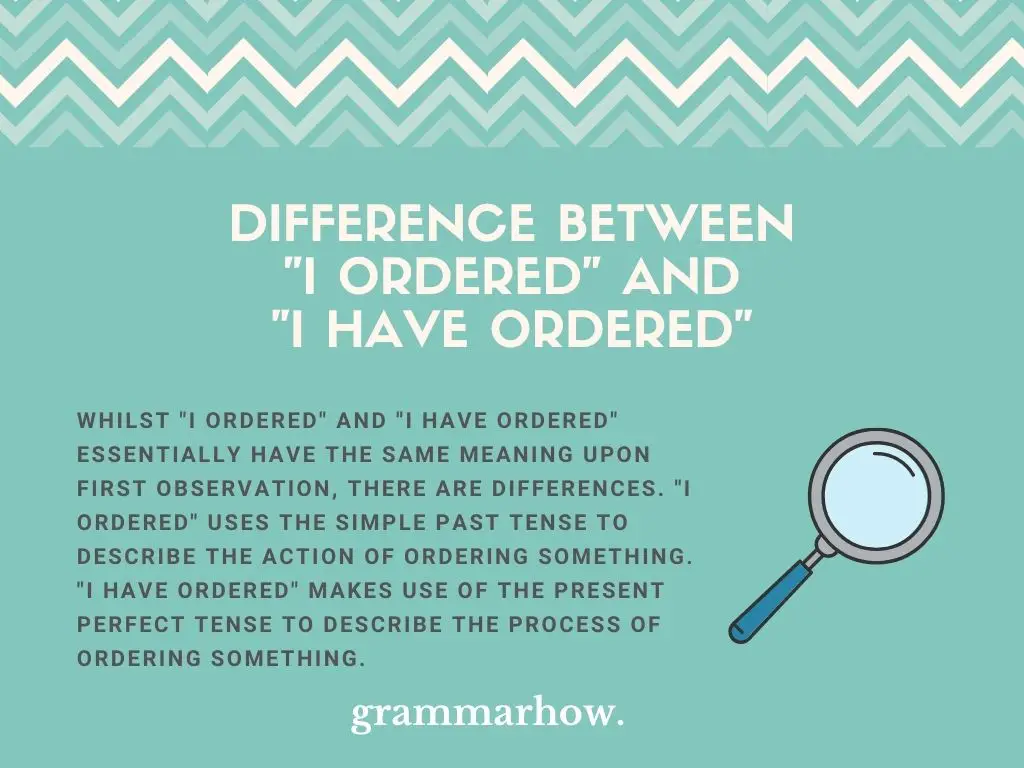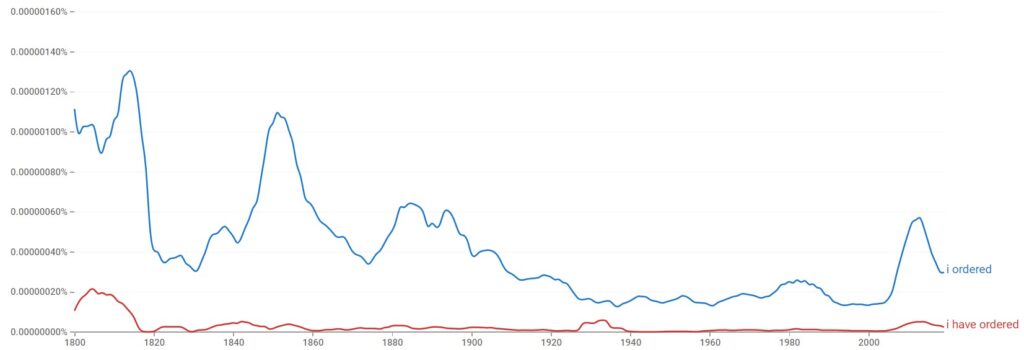The difference between the phrases “I ordered” and “I have ordered” can be a subject of confusion for many readers and writers. Consulting this article should make understanding this concept easier. The brief guide will explain the difference between the two phrases: “I ordered” and “I have ordered”.
What Is The Difference Between “I Ordered” And “I Have Ordered”?
Whilst “I ordered” and “I have ordered” essentially have the same meaning upon first observation, there are differences. “I ordered” uses the simple past tense to describe the action of ordering something. “I have ordered” makes use of the present perfect tense to describe the process of ordering something.

The phrase “I ordered” is used more often in conversation and sounds more “normal”. By using “I ordered”, the choice of tense more clearly expresses that this action occurred in the past.
However, using “I have ordered” in a sentence is perfectly acceptable and is used in the written and spoken word.
What Does “I Ordered” Mean?
“I ordered” is a phrase spoken regularly in everyday conversation and it can be included in a range of sentences. The phrase “I ordered” can also have different meanings. The word “ordered” is a verb in the simple past tense.
“I ordered” could relate to a number of different actions occurring in the past, including:
- To give an instruction.
- To request something to be supplied, made, or delivered.
- To arrange something methodically.
To help you to understand the meaning of the phrase “I ordered”, take time to note the following sentences which include the phrase “I ordered”:
- I ordered Sophie to get up out of bed.
- I ordered a drink in the local bar.
- I ordered a pizza last night because I felt like I deserved a treat.
- I ordered your present already because I know it is your birthday soon.
- I ordered the knives in the kitchen drawers to help tidy the kitchen.
What Does “I Have Ordered” Mean?
Like “I ordered”, “I have ordered” has different meanings. “Ordered” is a verb in the present perfect tense. By adding “have” to the verb, the action is shown to have happened at an indefinite time in the past, or began in the past and is continuing to the present time.
The phrase “I have ordered” can also be applied to the following sentences and scenarios:
- To give an instruction.
- To request something to be supplied, made, or delivered.
- To arrange something methodically.
To help you to understand the meaning of the phrase “I have ordered”, take time to note the following sentences which include the phrase “I have ordered”:
- I have ordered three pints of milk instead of two because two pints is not enough milk for the family.
- I have ordered the police to arrest him for trespassing in my garden.
- I have ordered myself a new dress to wear this weekend for the wedding.
- I have ordered you to leave the room; please do as I say.
- I have ordered the filing cabinet into a more organized arrangement.
Can “I Ordered” And “I Have Ordered” Be Used Interchangeably?
It is true that many writers and readers use the phrases “I ordered” and “I have ordered” in conversations and sentences with the same intentions and purposes. This is because “I ordered” and “I have ordered” essentially mean the same and can be used interchangeably.
However, “I ordered” is used more often and is regarded as more colloquial, more formal, and more grammatically acceptable to use in conversation.
Is “I Ordered” Or “I Have Ordered” Used The Most?
Over the years, the phrase “I ordered” has been used in sentences more than the phrase “I have ordered”.
This graph from Google Ngram Viewer illustrates the usage of “I ordered” and “I have ordered” in the time period 1800 to 2019. The line in red represents the usage of “I have ordered” and the line in blue represents “I ordered”.

As you can see from viewing the graph, the phrase “I ordered” has always been used more than “I have ordered”.
Is It Ever Correct To Use “I Had Ordered”
Using the phrase “I had ordered” in a sentence is indeed correct. The phrase “I had ordered” is frequently and correctly included in conversation and sentences. The phrase “I had ordered” is the past perfect tense to describe the action of ordering.
The past perfect tense is used to clarify that an event or action is complete and happened before another in the past.
Two examples of sentences including the phrase “I had ordered”:
- I had ordered three summer dresses, not two.
- The shoes I had ordered, unfortunately, were a different story altogether.
Final Thoughts
The phrases “I ordered” and “I have ordered” can be used interchangeably in a sentence, as they essentially mean the same thing. However, “I ordered” uses the simple past tense, whilst “I have ordered” uses the present perfect tense, and implies that the action of ordering either occurred in the past or began in the past and continues to the present moment.

Martin holds a Master’s degree in Finance and International Business. He has six years of experience in professional communication with clients, executives, and colleagues. Furthermore, he has teaching experience from Aarhus University. Martin has been featured as an expert in communication and teaching on Forbes and Shopify. Read more about Martin here.
